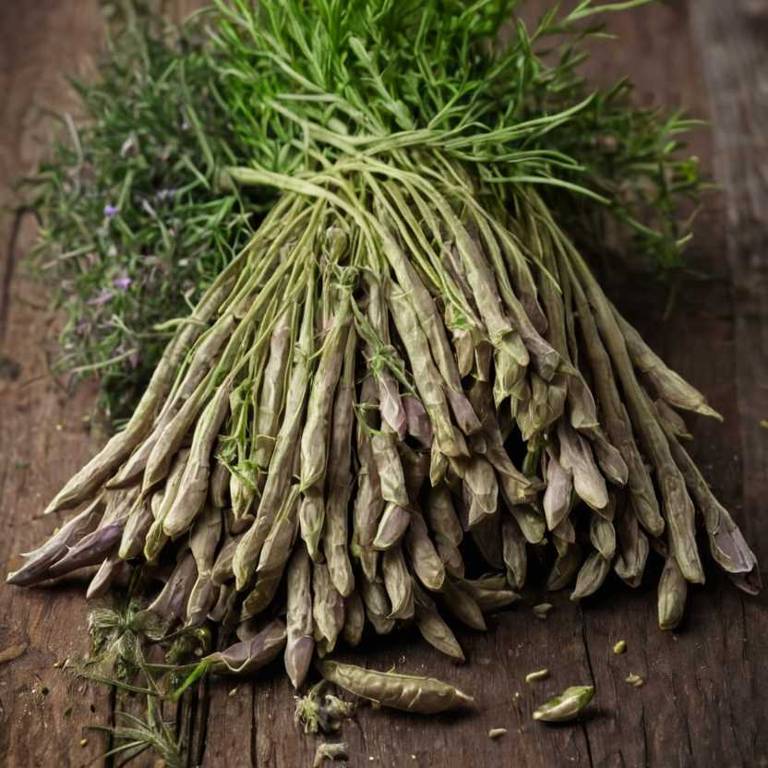10 Best Asparagus Racemosus Health Benefits

Asparagus racemosus, also known as shatavari, is a traditional Ayurvedic herb renowned for its numerous health benefits.
It is particularly valued for its ability to support reproductive health, helping to balance hormones and enhance fertility in both men and women. This herb is also rich in antioxidants, which help protect the body against oxidative stress and reduce the risk of chronic diseases. Asparagus racemosus has been shown to improve digestive health by promoting the secretion of digestive enzymes and supporting gut flora.
Additionally, it is believed to have adaptogenic properties, helping the body manage stress and maintain overall well-being.
1. Boosts digestive health
Asparagus racemosus boosts digestive health by promoting the production of digestive enzymes that aid in the breakdown of food.
It contains compounds that help regulate bowel movements and prevent constipation, making it beneficial for individuals with digestive disorders. The plant is also rich in fiber, which supports a healthy gut microbiome and enhances nutrient absorption. Additionally, it has anti-inflammatory properties that can soothe the gastrointestinal tract.
Overall, Asparagus racemosus is a valuable natural remedy for improving overall digestive function and promoting gut wellness.
2. Enhances immune system
Asparagus racemosus enhances immune system by stimulating the production of white blood cells, which are essential for fighting off infections and diseases.
It contains various bioactive compounds such as saponins, flavonoids, and polysaccharides that contribute to its immunomodulatory properties. These compounds help in reducing oxidative stress and inflammation, thereby supporting overall immune function. Regular consumption of Asparagus racemosus may improve the body's ability to resist viral and bacterial infections.
This makes it a valuable natural remedy for boosting immunity and maintaining good health.
3. Reduces inflammation
Asparagus racemosus reduces inflammation by containing bioactive compounds such as saponins, flavonoids, and polysaccharides, which have potent anti-inflammatory properties.
These compounds work by inhibiting the production of pro-inflammatory cytokines and enzymes like cyclooxygenase-2 (COX-2) and nuclear factor-kappa B (NF-κB), which are central to the inflammatory response. Studies have shown that Asparagus racemosus can help alleviate symptoms in conditions such as arthritis and digestive disorders by modulating the body’s inflammatory pathways. Its anti-inflammatory effects are further supported by traditional Ayurvedic use for treating inflammatory ailments.
Incorporating Asparagus racemosus into a balanced diet or supplement regimen may offer a natural and effective way to manage chronic inflammation.
4. Regulates blood sugar
Asparagus racemosus regulates blood sugar by enhancing insulin sensitivity and promoting glucose uptake in cells.
It contains bioactive compounds such as saponins and flavonoids that help in maintaining stable blood glucose levels. This herb has been traditionally used in Ayurvedic medicine to support metabolic health and prevent diabetes. Studies suggest that it may also reduce the risk of hyperglycemia by modulating pancreatic function.
Incorporating Asparagus racemosus into a balanced diet can be a natural way to support blood sugar regulation.
5. Improves liver function
Asparagus racemosus improves liver function by supporting the detoxification processes within the liver.
It contains bioactive compounds such as saponins, flavonoids, and alkaloids that help protect liver cells from damage caused by toxins and free radicals. Regular consumption of this herb may enhance the liver's ability to metabolize drugs and nutrients efficiently. Studies suggest that it can also reduce inflammation and oxidative stress, which are common factors in liver diseases.
As a result, Asparagus racemosus is considered a valuable natural remedy for maintaining and improving liver health.
6. Supports heart health
Asparagus racemosus supports heart health by helping to regulate blood pressure and cholesterol levels.
The plant contains bioactive compounds such as saponins and flavonoids, which contribute to its cardiovascular benefits. These compounds may help reduce oxidative stress and inflammation, both of which are linked to heart disease. Regular consumption of Asparagus racemosus may promote better circulation and overall cardiovascular function.
It is often used in traditional medicine for its ability to enhance heart health naturally.
7. Promotes skin health
Asparagus racemosus promotes skin health by providing essential nutrients that support skin regeneration and repair.
It contains antioxidants such as ascorbic acid and flavonoids, which help neutralize free radicals and reduce oxidative stress on the skin. These properties can help prevent premature aging and improve skin texture, making it appear more youthful. Additionally, the herb has anti-inflammatory effects that may alleviate skin conditions like acne and eczema.
Regular use of Asparagus racemosus in skincare routines can enhance overall skin vitality and maintain a healthy glow.
8. Aids in weight loss
Asparagus racemosus aids in weight loss by promoting metabolic efficiency and enhancing the body's ability to burn calories.
It contains compounds that help regulate appetite and reduce cravings, making it easier to maintain a calorie deficit. The herb also supports the detoxification process, which can improve overall body function and aid in weight management. Additionally, it may help in reducing fat accumulation by improving insulin sensitivity and hormonal balance.
Regular consumption of Asparagus racemosus can be a natural and supportive addition to a weight loss regimen.
9. Improves male health
Asparagus racemosus improves male health by enhancing reproductive function and fertility.
It contains bioactive compounds like saponins and alkaloids that support hormonal balance and sperm production. The herb is known to boost testosterone levels, which is crucial for maintaining libido and overall male vitality. Regular consumption of Asparagus racemosus may also help in reducing symptoms of erectile dysfunction and improving overall sexual health.
Its traditional use in Ayurvedic medicine further underscores its role in promoting male well-being.
10. Enhances brain function
Asparagus racemosus enhances brain function by promoting the production of neurotransmitters essential for cognitive processes.
It contains antioxidants and bioactive compounds that help protect brain cells from oxidative stress and inflammation. This herb supports memory, concentration, and overall mental clarity, making it beneficial for individuals seeking to improve their cognitive abilities. Regular consumption of Asparagus racemosus may also aid in preventing age-related cognitive decline.
Its neuroprotective properties make it a valuable natural supplement for maintaining brain health.